Government
State Seeks to Boost Mental Health Counseling
OAKLAND POST — It’s 1 p.m. on a balmy Oakland afternoon as residents of Great Expectations Residential Care, a home for people with mental illness, gather in an activity room for a game of bingo. Lee Frierson, an unpaid volunteer, introduces himself as he and his team leader, Charlie Jones, unpack chips, soda, batteries and shampoo that they will hand out as prizes.
It’s 1 p.m. on a balmy Oakland afternoon as residents of Great Expectations Residential Care, a home for people with mental illness, gather in an activity room for a game of bingo.
Lee Frierson, an unpaid volunteer, introduces himself as he and his team leader, Charlie Jones, unpack chips, soda, batteries and shampoo that they will hand out as prizes.
“I’m Lee with Reach Out,” Frierson says. “I’m a peer. I suffer from depression. It helps me to help you guys.”
“And I’m Charlie the angel,” Jones says. “We go to board-and-cares and psychiatric and wellness facilities to inspire hope and model recovery.”
A few rounds into the game, Frierson calls B-5, and a dark-haired man shouts, “Bingo!”
“Winner, winner, chicken dinner!” Frierson calls back, prompting chuckles.
What unfolds in this room is not exactly therapy, but it is something that mental health advocates and research suggest can be healing in its own right: people who have struggled with mental illness helping others who are experiencing similar struggles. Frierson and Jones are former mental health patients who now work with the Reach Out program, part of the nonprofit Alameda County Network of Mental Health Clients, which provides what is called peer support.
The value of peer support is recognized by Medicaid, the health insurance program for people with low incomes, and it funds such services. That money is available for certified peer-support workers in states that have a formal certification process.
California does not, and that means it is “leaving money on the table,” said Keris Myrick, chief of peer services at the Los Angeles County Department of Mental Health. South Dakota is the only other state with no peer certification program.
But a bill pending in Sacramento, SB-10, would direct the State Department of Health Care Services to create a process for certifying peer support workers and establish a set of core aptitudes and ethics guidelines for the job. The legislation passed the state Senate unanimously in May and will move to the Assembly Health Committee on Tuesday.
More than 6,000 peer support specialists already work in wellness programs, hospitals and clinics across California, according to SB-10’s sponsor, Sen. Jim Beall (D-San Jose). They help mental health patients navigate bureaucracies, find housing or locate services.
“They’re sharing their experiences: ‘Been there, done that, now I’m going to help another person,’” said Myrick, who has been diagnosed with schizoaffective disorder, was hospitalized several times and spent 10 years running a peer support program in Los Angeles.
Last year, the legislature unanimously passed a bill to certify peer support workers, but then-Gov. Jerry Brown vetoed it, saying it was costly and unnecessary.
Legislative analysts estimate the state would spend hundreds of thousands of dollars to set up a certification process and millions more a year to implement it. Advocates say the new federal money would help offset those costs. And, they say, the legislation would cement the bona fides of peer mentoring as an occupation.
Gov. Gavin Newsom has not declared his position on the current bill, but he has said that addressing the state’s mental health crisis is a top priority for his administration. During his campaign for governor, he endorsed “expanded roles for nurse practitioners and peer providers.”
Dr. Thomas Insel, a former director of the National Institute of Mental Health whom Newsom named in May as a key mental health adviser, told California Healthline he supports the peer certification bill.
“For many people, having a connection to someone else who’s had this experience proves vital,” Insel said. “There may be nothing more healing than giving people an opportunity to help others.”
Peer programs grew out of a movement in the 1970s opposing coercive psychiatric treatment, led by people who’d been treated against their will and felt they would receive better care from those who personally identified with their experiences.
Activism
S.F. Black Leaders Rally to Protest, Discuss ‘Epidemic’ of Racial Slurs Against Black Students in SF Public School System
Parents at the meeting spoke of their children as no longer feeling safe in school because of bullying and discrimination. Parents also said that reported incidents such as racial slurs and intimidation are not dealt with to their satisfaction and feel ignored.

By Carla Thomas
San Francisco’s Third Baptist Church hosted a rally and meeting Sunday to discuss hatred toward African American students of the San Francisco Unified School District (SFUSD).
Rev. Amos C. Brown, president of the San Francisco NAACP and pastor of Third Baptist Church, along with leadership from local civil rights groups, the city’s faith-based community and Black community leadership convened at the church.
“There has been an epidemic of racial slurs and mistreatment of Black children in our public schools in the city,” said Brown. “This will not be tolerated.”
According to civil rights advocate Mattie Scott, students from elementary to high school have reported an extraordinary amount of racial slurs directed at them.
“There is a surge of overt racism in the schools, and our children should not be subjected to this,” said Scott. “Students are in school to learn, develop, and grow, not be hated on,” said Scott. “The parents of the children feel they have not received the support necessary to protect their children.”
Attendees were briefed last Friday in a meeting with SFUSD Superintendent Dr. Matt Wayne.
SFUSD states that their policies protect children and they are not at liberty to publicly discuss the issues to protect the children’s privacy.
Parents at the meeting spoke of their children as no longer feeling safe in school because of bullying and discrimination. Parents also said that reported incidents such as racial slurs and intimidation are not dealt with to their satisfaction and feel ignored.
Some parents said they have removed their students from school while other parents and community leaders called on the removal of the SFUSD superintendent, the firing of certain school principals and the need for more supportive school board members.
Community advocates discussed boycotting the schools and creating Freedom Schools led by Black leaders and educators, reassuring parents that their child’s wellbeing and education are the highest priority and youth are not to be disrupted by racism or policies that don’t support them.
Virginia Marshall, chair of the San Francisco NAACP’s education committee, offered encouragement to the parents and students in attendance while also announcing an upcoming May 14 school board meeting to demand accountability over their mistreatment.
“I’m urging anyone that cares about our students to pack the May 14 school board meeting,” said Marshall.
This resource was supported in whole or in part by funding provided by the State of California, administered by the California State Library via California Black Media as part of the Stop the Hate Program. The program is supported by partnership with California Department of Social Services and the California Commission on Asian and Pacific Islander American Affairs as part of the Stop the Hate program. To report a hate incident or hate crime and get support, go to CA vs Hate.
Bay Area
Mayor London Breed: State Awards San Francisco Over $37M for Affordable Housing
On April 30, Mayor London N. Breed announced San Francisco has been awarded more than $37.9 million in funding from the California Department of Housing and Community Development (HCD) as part of the State’s Multifamily Housing Program (MHP). The HCD loan will provide the final funding necessary for development of Casa Adelante – 1515 South Van Ness, a 168-unit affordable housing project located in San Francisco’s Mission District.
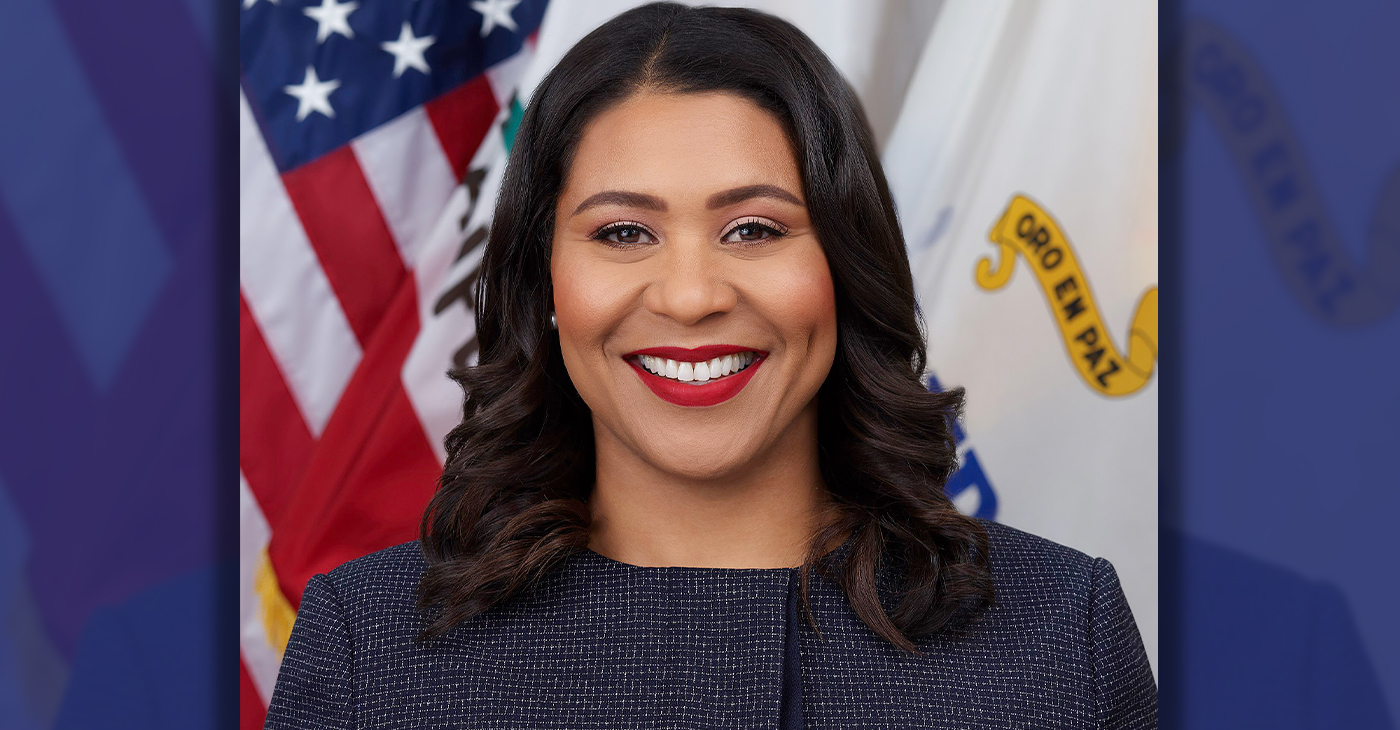
By Oakland Post Staff
On April 30, Mayor London N. Breed announced San Francisco has been awarded more than $37.9 million in funding from the California Department of Housing and Community Development (HCD) as part of the State’s Multifamily Housing Program (MHP).
The HCD loan will provide the final funding necessary for development of Casa Adelante – 1515 South Van Ness, a 168-unit affordable housing project located in San Francisco’s Mission District.
The new development at 1515 South Van Ness Ave. will provide 168 affordable homes to low-income families, formerly homeless families, and persons living with HIV earning between 25-80% of the San Francisco Area Median Income (AMI).
In addition, the project is anticipated to provide family-friendly amenities and ground floor community-serving commercial spaces that preserve the prevailing neighborhood character of the Calle 24 Latino Cultural District.
“This funding unlocks our ability to move on building affordable housing units for families in San Francisco at a crucial time. We understand the level of need for more housing that is accessible, and like the state, the city continues to face a challenging budget cycle,” said Breed. “1515 South Van Ness is a good example of what can be achieved in San Francisco when you have strong community partnerships and an unwavering commitment to deliver on critical needs for our residents.”
“From the beginning of my term as Supervisor, I have fought to bring affordable housing to 1515 South Van Ness” said Supervisor Hillary Ronen. “In the interim, the site has been utilized for homeless services and shelter, and I am thrilled that HCD has recognized the value of this development, and we are finally ready to break ground and bring 168 affordable homes to low income and formerly homeless families in the Mission.”
Owned and occupied by McMillan Electric Company until 2015, the City and County of San Francisco purchased 1515 South Van Ness Avenue in June 2019 with the intent of developing new affordable housing.
In November 2020, the San Francisco Mayor’s Office of Housing and Community Development (MOHCD) released a Multi-site Request for Qualifications (RFQ) seeking qualified developers to build affordable housing on the site, and subsequently selected Chinatown Community Development Corporation (CCDC) and Mission Economic Development Agency (MEDA) in May 2021 to develop the site.
The project is expected to begin construction in winter 2025.
“A strong, long-term push by Mission advocates to make this site 100% affordable is now paying off, with 168 family units that include services and childcare. People of color communities know what they need, and we are excited to be in partnership with a team, consisting of MEDA, CCDC, and MOHCD, that listens,” said Malcolm Yeung, Executive Director at CCDC.
“We are excited to be in partnership with CCDC, yet again, and for the opportunity to develop intergenerational affordable housing in the City’s Mission District,” said Luis Granados, executive director at MEDA.
Increasing housing affordable to lower-income and vulnerable residents is a key priority in the City’s Housing Element which calls for additional funding for affordable housing production and preservation, as well as Mayor Breed’s Housing for All Executive Directive that sets out the steps the City will take to meet the bold goal of allowing for 82,000 new homes to be built over the next eight years.
Tuesday’s funding announcement emphasizes the importance of regional and state collaboration in order to reach our housing and climate goals.
“We are thrilled—not just to bring a project of this size to a community with great need — but to do so with community-based developers and their partners who understand the neighborhood and sensitivities around cultural preservation,” said HCD Director Gustavo Velasquez.
Alameda County
D.A. Pamela Price Fights Back Against Recall
In an attempt to thwart the recall call campaign against her, Alameda County District Attorney Pamela Price announced at a press conference on Tuesday, April 30, that her team is launching a state investigation on the political action committee funding the recall. Speaking at Everett and Jones Barbeque Restaurant at Oakland’s Jack London Square, Price accused the recall campaign as undemocratic and says she will fight against injustice.
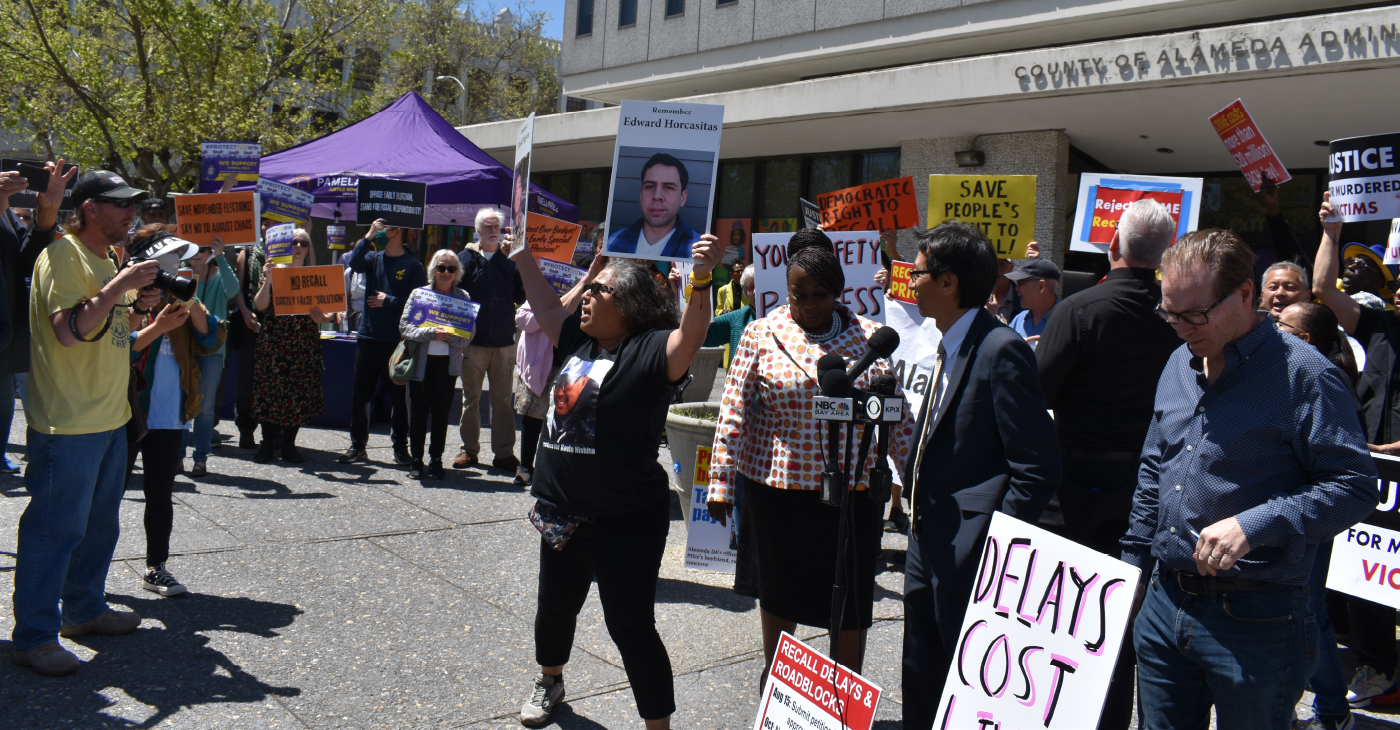
By Carla Thomas
In an attempt to thwart the recall call campaign against her, Alameda County District Attorney Pamela Price announced at a press conference on Tuesday, April 30, that her team is launching a state investigation on the political action committee funding the recall.
Speaking at Everett and Jones Barbeque Restaurant at Oakland’s Jack London Square, Price accused the recall campaign as undemocratic and says she will fight against injustice.
Price announced that the California Fair Political Practices Commission (CFPPC) was looking into the complaint filed by her supporters against two groups supporting the recall.
Price said the group Reviving the Bay Area appears to be the financial and organizational arm of Save Alameda For Everyone (SAFE), the group leading the recall effort against her. The complaint by recall-opposing group Protect the Win for Public Safety alleges Reviving the Bay Area has breached the law by not filing a third quarter report listing its contributors and hiding its funding sources from the public at least through September of 2023.
Price also claimed that the SAFE recall group is functioning illegally both financially and operationally.
“Between September 2023 and November 2023, they donated approximately $578,000 to SAFE without complying with the laws that govern all political committees in California,” said Price. “We applaud the FPPC’s action to investigate this entity as well as the finances that have also come under question of the SAFE committee, where we’ve learned that they were paying some of the main spokespersons and funding an illegal force that they called a security force.
“So there have been a lot of financial irregularities, coupled with the irregular practices of the signature-gathering company PCI Communications that literally paid for hundreds of people to come into our community and gather signatures using bait-and-switch tactics and misleading people and engaging in fraudulent signature-gathering.”
Price also accused the Alameda County Registrar of Voters of not operating properly.
At a press conference at the City Hall Plaza late Tuesday afternoon, SAFE and recall supporters demanded that supervisors set a special election date before the November general election. Supporters of Price and opposers of Price clashed and spoke passionately against each other.
Supporters of the recall feel that Price’s, criminal justice reforms support perpetrators of crime, rather than the victims. They also blame Price for higher crime rates in the county. Price supporters feel that her reforms are necessary to transform an unjust system. “Price’s role is to uphold the law and this recall campaign is an attack on her,” said Oakland attorney Walter Riley.
Recall opponents reject those assertions and say Price’s critics don’t understand the role the county’s top prosecutor plays in the criminal justice system.
Price also said she would be going before the Alameda County Board of Supervisors on Tuesday to challenge the signature count for her recall campaign.
Later in the evening, the Board of Supervisors unanimously voted in support of the recall, citing that enough signatures had been collected for the recall effort to continue.
On May 14, the Board of Supervisors will determine a date for a special election recall or place on the November ballot. According to Price, a special election recall will cost the county 15-20 million dollars and her supporters hosted another rally last week, urging the Board of Supervisors to not approve a special election recall.
#PamelaPrice #Recall #AlamedaCountyDA
-

 Community3 weeks ago
Community3 weeks agoFinancial Assistance Bill for Descendants of Enslaved Persons to Help Them Purchase, Own, or Maintain a Home
-

 Business3 weeks ago
Business3 weeks agoV.P. Kamala Harris: Americans With Criminal Records Will Soon Be Eligible for SBA Loans
-

 Activism4 weeks ago
Activism4 weeks agoOakland Post: Week of April 10 – 16, 2024
-

 City Government4 days ago
City Government4 days agoCourt Throws Out Law That Allowed Californians to Build Duplexes, Triplexes and RDUs on Their Properties
-

 Activism2 weeks ago
Activism2 weeks agoOakland Post: Week of April 24 – 30, 2024
-

 Community3 weeks ago
Community3 weeks agoAG Bonta Says Oakland School Leaders Should Comply with State Laws to Avoid ‘Disparate Harm’ When Closing or Merging Schools
-

 Community3 weeks ago
Community3 weeks agoRichmond Nonprofit Helps Ex-Felons Get Back on Their Feet
-

 Community3 weeks ago
Community3 weeks agoOakland WNBA Player to be Inducted Into Hall of Fame

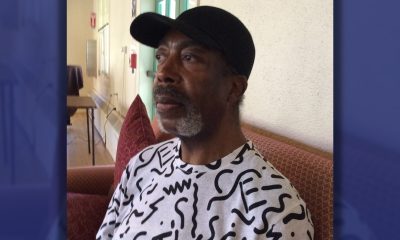





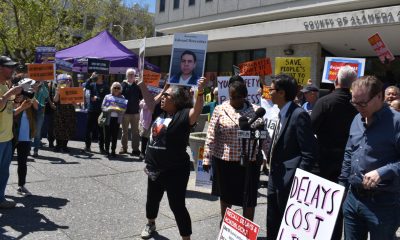

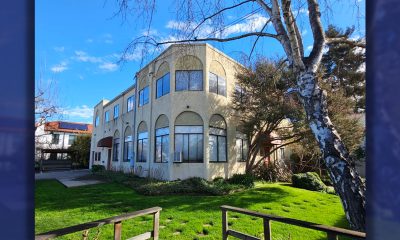

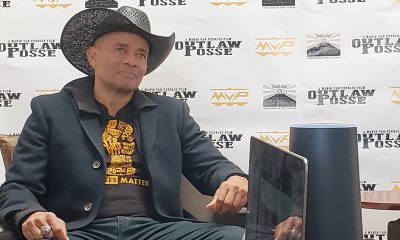









































1 Comment